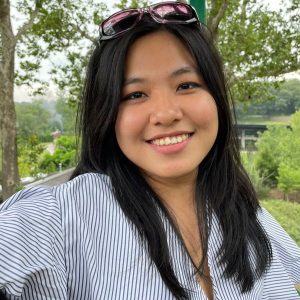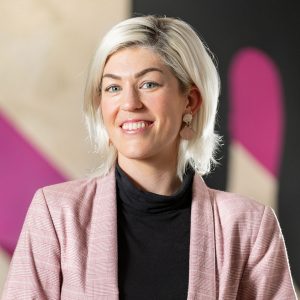International students have always been vital members of UNC’s School of Social Work. By bringing cultural and intellectual diversity to the classrooms, these students help their social work classmates better understand international, foreign affairs, and immigration issues and help to inform discussions around stereotyping and xenophobia.
Although applications from international students have declined in recent years, School leaders say numbers are increasing again, along with enhanced efforts to recruit more students from countries outside of the United States.

These future scholars and practitioners are needed to help advance the University’s mission to solve some of the world’s most challenging problems, said Gina Chowa, the School’s associate dean for global engagement. At the same time, the success of this work is dependent upon ensuring the next generation of social workers have a global mindset, whether practicing in the United States or in the international arena, she said.
“We are a global community; America does not exist in a vacuum,” she said. “America exists in a world that has different cultures and different ways of doing things. Our students have to understand what is happening around the globe and how that impacts us here. Poverty doesn’t exist in isolation. This war in Ukraine affects us all. We are interconnected. So, as social workers, we have to be aware of our surroundings or environment.”
Perhaps, most important, nearly every profession, including social work, is feeling the pressure to be globally competent, Chowa added. With that reality in mind, Chowa and other School leaders have been working to strengthen recruiting efforts in recent years to attract more global students to social work.
Campuswide, UNC enrolls more than 2,100 international students from more than 100 countries every year. Although the pandemic slowed some of the School of Social Work’s activities, the current handful of international students includes three who are pursuing their doctorate degrees – one of the School’s largest cohorts of global Ph.D. students. (Read more about our Ph.D. students.)
“Certainly, we’ve had international students over the years, but for half the class to be from outside the United States, is a big change,” said Mimi Chapman, associate dean for doctoral education. “What this says to our global engagement office is we take you seriously, and we take your mission seriously.”
A lack of funding for international students is most often the biggest barrier to increasing enrollments, said Sharon Holmes Thomas, the School’s assistant dean for recruitment, admissions and financial aid. However, programs such as the Fulbright Foreign Student Program and the Duke-UNC Rotary Peace Center are helping to bridge the gap, Thomas said.
“We are fortunate to have relationships with both programs because they provide the critical financial support our international scholars need to enroll in our MSW program,” she said.
Pursuing their academic dreams

First-year MSW student Hayman Linn Lae Zaw is the School’s first ever Fulbright Foreign Student award winner. Hayman is from Myanmar and was pursuing her postgraduate diploma in social work when she had to pause her studies due to the country’s military coup. Although Hayman, who holds a degree in the English language, had been working for a professional language training service, she longed to be a changemaker. She is especially passionate about assisting vulnerable communities, specifically children and youth under institutional care.
In Myanmar, Hayman spent the last few years sharpening her social work skills by working for several youth-centered organizations, including one that among other activities, focuses on reuniting state detained children with their families, one that develops youth leadership skills and another that prepares youth for employment.
As a student pursuing a concentration in community management and policy practice, Hayman is grateful for the opportunity to study at UNC and knows the knowledge and skills she’ll receive will enable her to better support the well-being of youth in Myanmar when she returns.
“I have witnessed so many vulnerable children in my country who have experienced poverty and violence in their families,” Hayman said. “These children have been served by poor child welfare systems. My hope after I graduate is that I can give back to them and support them with the kinds of resources they need to find employment, to support their mental well-being or whatever they need to stand on their own.”
For Alexandra Rose, a first year MSW student and award winner of the Rotary Peace Center Fellowship, the offer to study at UNC and Duke is a lifetime opportunity.
Rose, who grew up in Australia and earned undergraduate degrees in social science from the University of Queensland and Queensland University of Technology, has spent the last several years embedded in international humanitarian work and in the field of gender-based violence. In 2016, while working on the Pacific island nation of Nauru, which lies between Australia and Hawaii, she developed a trauma prevention-based intervention to support the social and personal healing of 2,500 asylum seekers displaced from their homes in the Middle East and Sub-Saharan Africa.
“I fell into social work roles kind of accidentally and then it got to the point where I was doing what I would describe as social work for quite a long time but without the formal education,” Rose explained.

Although Rose supplemented her on-the-job training with as much reading about social work practice as she had time for, she quickly realized her limitations and began to consider earning her MSW in the United States.
“I just realized how important it was for me to marry this kind of personal experience with the academic qualification,” she said. “Because no matter how much reading you do outside of work hours or how much you learn on the job, there’s a structure embedded within the MSW curriculum that offers something different, rigorous, in-depth and broad. That kind of rigor is really what I’ve been wanting to add so that I have greater confidence in my social work practice in an international setting.”
Most recently, Rose’s work has been in galleries and museums, where she’s been exploring ways to use art as a tool for critical thinking and ethical reflection to connect past struggles to today’s movements for social justice.
“From what I’ve learned, museums are really craving social work discourse,” she said. “They don’t describe it in those ways and they don’t necessarily know it in those terms. But galleries and museums are a very fertile space for bringing some of these really challenging but humanity-and dignity-based discussions into a place that has a lot to say about history and culture and power.”
That the School of Social Work will prepare her to explore this framework is exciting, Rose added.
“When I saw that the School of Social Work’s mission is to advance equity, transform systems and improve lives, that was it,” she said. “I thought, ‘Why look any further. This is it.’ That mission really calls for connection around my work.”
Planning for the global future
Connecting students, researchers, scholars and others from various disciplines across the UNC campus and beyond is exactly what Chowa was aiming for when she launched UNC’s Global Social Development Innovations in 2017. Today, Chowa, who directs GSDI and its team of researchers, work with global partners to produce evidence, develop interventions and impact policy to improve the economic and social welfare of women, youth and their families around the world. The team is currently working on projects in seven countries, including initiatives that impact financial literacy, gender equity, access to education, food security and youth employment.
Such activities, along with a focus of preparing future social workers for global practice and rigorous research work, will undoubtedly help to attract additional international students to the School in the coming years, Chowa said.
In the meantime, she and School leaders continue to update the curriculum, especially within the specialization year, to ensure that non-Eurocentric focused course material is included and that all students are able to connect the dots between global concerns and U.S. issues.
School leaders also have spent the last few years aligning internal structures with University policies to support a global immersion program, which will be piloted in the spring to South Africa. The program will “expose students to the diversity of social work structures, systems and institutions through a cultural humility lens,” said Neil Bilotta, clinical assistant professor who is leading the School program.
“We will examine the ways that historical colonialism, power, and oppression inform social work in global contexts,” Bilotta noted. “Our students will be led by local social work organizations to understand the cultural specificities and sensitivities of particular communities and societies.”
In addition, Chowa has been encouraging investment in visiting speakers and scholars, who can share a wide range of global perspectives with students.
“We’ve made a lot of progress but there is still work left to do,” she said. “We also need to make sure that folks who want to work in a global setting get the content they need so they are prepared and competent to do so.”

